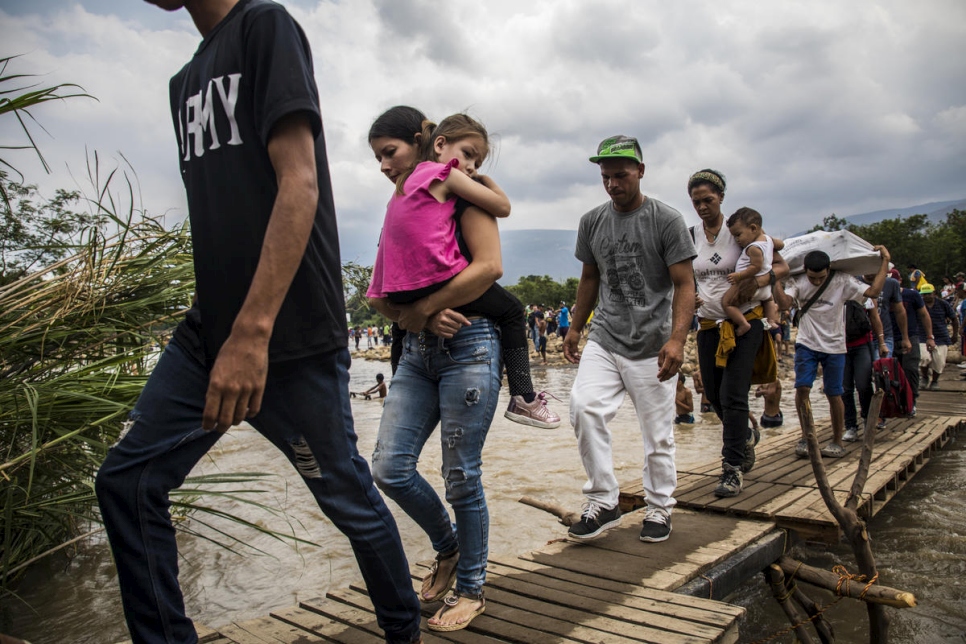UN Refugee Chief urges Security Council for firm response to record-high displacement
Filippo Grandi stressed that it is possible to address unprecedented stigmatization of refugees and migrants.

UN Refugee Chief Filippo Grandi during his speech at the UN Security Council in New York on the status of the world's displaced people. © UN Photo/Evan Schneider
NEW YORK – The UN High Commissioner for Refugees, Filippo Grandi, today reminded international leaders at the United Nations Security Council of their critical role in finding urgent responses to the unabating displacement crises across the world at a time when toxicity in language about refugees and migrants is on the rise.
In a speech to the UN Security Council in New York, Grandi identified the way forward to address the many crises unfolding worldwide.
“To portray this as a global crisis that is not manageable, in my opinion, … is wrong,” he said. “With political will, which you represent here at the highest level, [and] with improved responses as they are enshrined in the Global Compact on Refugees, adopted by the General Assembly in December, it is possible and urgent to address these crises, and you as Security Council have a critical role.”
An unprecedented 68.5 million people around the world have been forced to flee. Among them are nearly 25.4 million refugees, over half of whom are under the age of 18. The vast majority of refugees are hosted in developing countries.
"85 per cent of the world's refugees are in poor or middle-income countries. That's where the crisis is."
The UNHCR chief made three appeals to the members of the Security Council. First, he urged the Security Council to work jointly to address the lack of peace and security, the root cause of crises.
“Of the nearly 70 million people that are displaced or refugees, most are fleeing conflict,” he noted. “If conflicts were prevented or resolved, most refugee flows would disappear. Still, we observe from where we are very fragmented approaches to peacemaking, very insufficient approaches to peace building.”
He cited growing violence in Libya, where all civilians are at risk, and expressed particular concern for the refugees and migrants trapped in detention centres in areas of fighting.
Grandi later reported that today UNHCR managed to relocate more than 150 people from the Ain Zara detention centre in south Tripoli to UNHCR’s Gathering and Departure Facility in a nearby safe zone.

Venezuelan refugees and migrants trek across the border to reach Cucuta, Colombia. © UNHCR/Vincent Tremeau
Grandi also appealed to Member States to bolster support for host countries. “85 per cent of the world's refugees are in poor or middle-income countries. That's where the crisis is. Support must be stepped up,” he said. “Their hospitality must not be taken for granted.”
The UN Refugee Chief highlighted “outstanding” Latin American solidarity in the face of the outflow of 3.4 million Venezuelans to 15 countries in the region, including Colombia, Peru, Ecuador and Brazil.
“Our appeal for humanitarian crises in that region is one of the most poorly funded globally,” he said. “Failure to [support those countries] will leave those governments exposed.”
"It is equally a right to choose not to return.”
He added that the Global Compact on Refugees – a new international framework agreed upon by Member States last December – will ensure shared responsibility to support those forced to flee conflict and persecution, as well as the communities which host them.
Grandi also urged Council members to work collaboratively to remove obstacles that prevent people from voluntarily returning in safety and dignity to their countries of origin.
“We are increasingly challenged by one type of scenario where peace is not completely established,” he declared. “[But that] very often translates into pressure on refugees to return under less than ideal circumstances.”
“We think return is a right,” Grandi said. “But it is equally a right to choose not to return.”
He cited the wish of nearly six million Syrian refugees to go home, but noted that many are reluctant to return, citing a number of worries including housing, employment and security as well as property and documentation issues.
“We need access for UNHCR and United Nations staff to the areas where people return to build that confidence that they desperately need to make that very difficult choice,” Grandi added.
Grandi also pointed to Myanmar, where return will not be possible unless conditions of safety and dignity are met, especially in light of continuing insecurity in northern Rakhine state.
Echoing Grandi’s remarks, Security Council members expressed great concern over the record-high figures of global displacement and renewed their commitment to support affected populations. They recognized the link between conflict and displacement and the imperative to work concertedly to address root causes of conflict.
A number of Member States expressed hope that the adoption of the Global Compact on Refugees will give new impetus to international cooperation to address displacement, bringing in new actors from the development and private sectors. Many also echoed Grandi’s insistence on the right to voluntary, well-informed and dignified return.

